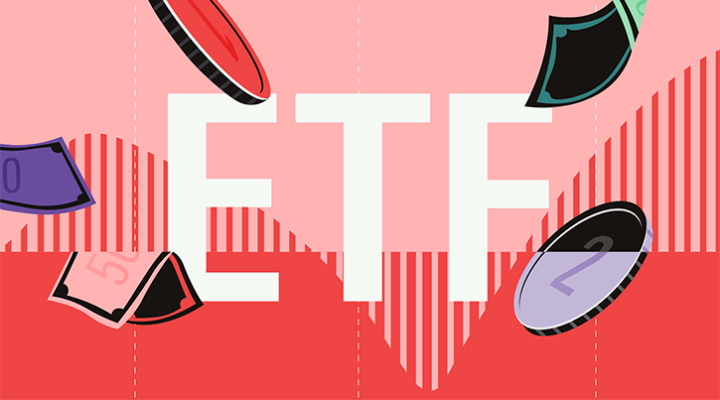Ben Johnson: I’d like to delve a little bit more into the details of some of the funds that you're managing. We’re in a market environment where investors are hanging on Fed chairman Ben Bernanke's every word, and most recently the market threw a bit of what's been branded a taper tantrum in response to some of the comments coming out of the Federal Reserve. I'm curious to know how that affected SPDR SSgA Income Allocation ETF and what you've done in the wake of the market’s taper tantrum to reposition your portfolio.
Chris Goolgasian: I think the first point on that is the shareholders, the clients, and the marketplace need to have a perspective that given how big the problems are in the world, the vocabulary changes of politicians and central bankers have an incredibly larger impact than we ever thought they would when the problems of the world were smaller. Their vocabulary changes disproportionately impact markets, and that's because the problems are so big. If the problems were smaller, we wouldn't be leaning on every bated breath of the next announcement and what the word change is. When the taper comes out, that is a significant change of pace for Bernanke, and the markets reacted accordingly. And I think as long as globally we have these types of significant debt issues, we’re going to have to continue to live with vocabulary-induced volatility.
What we've been talking about for investors is a concept called the optimistic unknown, and the optimistic unknown is that when you have something in front of you that’s really unattractive, say, in this case certificates of deposit, money markets, and short-term bonds with near-zero rates, when you have that you know for sure that that's not attractive. What it causes you to do is to optimistically buy something that you may not fully understand. But you know that on the surface it has a better yield, and you’re optimistic it will turn out okay. This decision path exists in many walks of life. It exists in politics where people move elections in the same pattern, where the person who is in office now, you are for sure certain that you do not like them. You don’t really know this new candidate, but you’re optimistic he'll turn out better. So you vote for the new candidate.
It happens the same way in the medical field in terms of some amazing statistics about only one in three men even have a physician. They are making these decisions, and when I give these speeches, I talk to the crowd and say, "Raise your hand if you have physical in last 12 months." Very few hands go up. Then I say, "Raise your hand if you have walked into a casino, bought a lottery ticket, or bet on a football game in last 12 months?" And most of the hands go up. Some people say they wished they had three hands. There's an optimistic unknown there too: I really don't want to know what the doctor is going to say, but I'm optimistic that when I gamble something good will happen.
These decisions happen in all walks of life and they’re happening right now in the chase for yield. Our view is that there's nothing wrong with any of these asset classes that have had billions and billions of dollars injected in them; nothing wrong with any of them individually. The concern is, do investors fully understand the mechanics of leveraged-loan funds, master limited partnerships, emerging-markets debt funds? Do they fully understand the risk and the construction in those securities the way they understand a CD or money market or Treasury bill? Probably not. Not every cent of all the billions of dollars in those asset classes probably fully understands the mechanism that they’re in compared with how they understand CD. That optimistic unknown that’s leading to that yield-chasing is probably better-served outsourced, and this is our view. In our products we've got a number of those same asset classes that we’re talking about--emerging-markets debt, preferred stocks, real estate, and all those things--we hold those. They are good investments. But I think we’re hopeful that putting them in a diversified basket and having some viewpoint on when to be in them is more beneficial than end investors just chasing them based on their yield.
In the last month or so with the taper talk, I’d say the biggest outcome for us is that throughout the year we've been overweight equity and underweight fixed income across most of the products. In that fixed-income bucket we've been overweight corporate bonds and underweight traditional Treasury and mortgage bonds, and that spread has been pretty attractive and has worked out. That really hasn't changed through the taper talk. I think the biggest advantage you can have in this market, as has been shown throughout the year, is to have an equity perspective over a fixed-income perspective. That clearly was shown with the taper talk, but that was also working before the taper talk. Equities have thoroughly outperformed for the year.
Johnson: Somewhat sort of inextricably linked to what we’re talking about as it pertains to quantitative easing is the topic of inflation. I think inflation has been a hot topic, sort of hot/cold, since we came out of the worst of the financial crisis. One would think that inevitably the type of money printing that's been going on will, at some point in the future, lead to inflation, but what we’re getting from the real economy in terms of reads on inflation is that those fears have yet to materialize. I'm curious to know how that has affected SPDR SSgA Multi-Asset Real Return ETF, as well as the broader peer group, and what your inflation outlook is.
Goolgasian: Inflation definitely has been muted. It looks like it will be muted, and real asset classes attached to inflation have certainly felt that pain, no doubt about that. I think where the marketplace has come down on this, I would say, in the last six months or so, is that people previously were buying real assets as an allocation in their bigger mix as an insurance policy for future inflation down the road. That is a good and just reason to do it. What happens though to all investors is that, as soon as the S&P 500 goes up 20%, the diversification idea goes out the window. And then you have the [thought process of] "Do I really need this protection down the road when the S&P is up 20%?" As soon as you get a bull market, diversification reasons tend to fall by the wayside.
I think the question that investors need to say themselves is, "Did anything change between yesterday and today in terms of why I bought a real asset or real return-type of product? And the answer is largely "no." There has been, is, and will be massive monetary printing in the world. That has not changed. There has been, is, and will be massive structural problems in debt in all of the developed nations. The possibility exists that either an inflationary run will happen or there’ll be some type of currency issue somewhere, such that real assets will be about the only place in a typically diversified portfolio that is going to benefit from that. Insurance, like for your house or anywhere else, is best bought before the issue and the accident, and it's cheaper when you do that and have it when you need it. Real assets fit that bill. They are certainly cheaper right now.
I think that with the marketplace, we constantly hear--and I’m sure you do, too--there are no asset classes that are attractive. Everything is overpriced, including the bond market and the stock market, and emerging markets and developed markets, and small-cap and large-cap sectors. Everything is overpriced.
There is something that’s not overpriced, and that’s real assets. Real assets have taken a hit on this lack of inflation. Commodities have been hurt by that, and the commodity producers in the equity space have been hurt by that significantly. There are asset classes that are not doing well and that have valuations that seem much more attractive than their past did. Of course, in that environment, investors then don’t want to buy them, when actually they should be buying them and should be taking on that insurance.
I don’t think our view has changed on the portfolio benefits of real assets. What has changed is, for sure, the marketplace has gotten a little bit more bullish on growth, and the S&P has reflected that. But the thesis of why you would need this asset class clearly hasn't changed. When you look at just what’s happened in Japan in the last few months, it's clear that on a global basis there is even more to the thesis than there ever was.




























